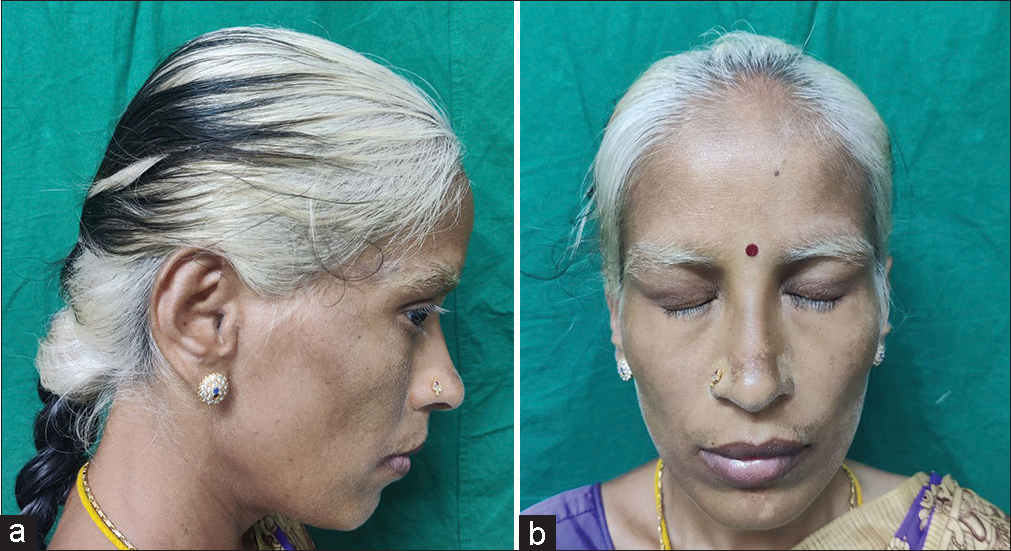Translate this page into:
Pazopanib-induced canities subita

*Corresponding author: Aravind Sivakumar, Department of Dermatology, JIPMER, Puducherry, India. aravinddermat@gmail.com
-
Received: ,
Accepted: ,
How to cite this article: Sivakumar A, Vageshappa RK. Pazopanib-induced canities subita. CosmoDerma 2023;3:144.
A 40-year-old woman presented with complaints of sudden whitening of scalp hair for 2-week duration. She was recently diagnosed with a case of metastatic renal cell carcinoma started on pazopanib and received six cycles when she noticed rapid whitening of the scalp hair. On examination, there was diffuse depigmentation of scalp hair over the scalp, associated with poliosis of the eyebrows and eyelashes [Figure 1a and b]. Hence, a diagnosis of pazopanib-induced rapid hair depigmentation or canities subita was made.
Hair pigmentation is regulated by receptor tyrosine kinase c-kit and its interaction with stem cell factor or steel factor. Mutation in the c-kit gene is known to cause an autosomal dominant inherited condition known as piebaldism characterized by white forelock and poliosis with vitiligo-like symmetrical depigmentation.[1] Pazopanib is a recently approved drug for metastatic renal cell carcinoma which is a multikinase inhibitor including inhibition of receptor tyrosine kinase c-kit causing sudden whitening of the scalp hair akin to canities subita seen in alopecia areata diffusa.[2] Similar hair changes have been reported with other tyrosine kinase inhibitors such as sunitinib and imatinib. These hair changes are temporary with the return of pigmentation usually seen with drug stoppage, suggesting the temporary cessation of pigmentation as the cause.[3]

- (a and b) Diffuse whitening of scalp hair noted along with eyebrow and eyelash poliosis.
Declaration of patient consent
The authors certify that they have obtained all appropriate patient consent.
Conflicts of interest
There are no conflicts of interest.
Use of artificial intelligence (AI)-assisted technology for manuscript preparation
The authors confirm that there was no use of Artificial Intelligence (AI)-assisted technology for assisting in the writing or editing of the manuscript and no images were manipulated using AI.
Financial support and sponsorship
Nil.
References
- Adverse hair reactions to new targeted therapies for cancer. Actas Dermosifiliogr (Engl Ed). 2019;110:182-92.
- [CrossRef] [PubMed] [Google Scholar]
- Gray hair associated with the multitargeted receptor tyrosine kinase inhibitor pazopanib. Ann Dermatol. 2015;27:791-2.
- [CrossRef] [PubMed] [Google Scholar]





